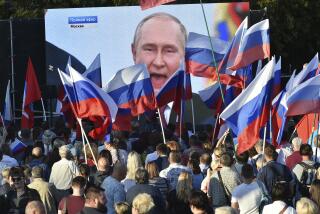A Smaller U.S.S.R.? A More Stable One? : Experts Think at Least the Baltics Will Go
- Share via
Mikhail Gorbachev is struggling to maintain the geographic coherence of the Soviet empire. He may succeed for now in suppressing nationalist independence movements, as the czars and commissars before him brutally succeeded, but ultimately the tide of history seems to be running against him. The end of this decade will likely see a Soviet Union that is reduced in size but, conceivably, one that is economically and politically stronger for having undergone amputation. That’s the consensus of six experts on Soviet affairs interviewed by The Times. Their views appear on Page 1 of this section.
What the odds at this point most greatly favor is the eventual return of the Soviet Union to its 1939 borders, to the time before the Hitler-Stalin pact set the stage for the forcible absorption of the Baltic states of Estonia, Latvia and Lithuania. Additionally, the small southwestern republic of Moldavia, with its largely Romanian population, might seek to rejoin Romania as the province of Bessarabia. Georgia and Azerbaijan, briefly independent after the Russian Revolution, could again seek to become so.
No one expects that secessionism will not be vigorously, even militantly resisted. Gorbachev could paraphrase Winston Churchill in 1942: He did not become his nation’s leader in order to preside over the dissolution of the Soviet empire. Gorbachev instead proposes a new confederal system offering more local autonomy to the 15 republics, while leaving control of foreign and defense policies with Moscow, although he is now hinting at eventual independence for Lithuania. Most of the poorer republics on the southern periphery would probably conclude that their best economic interests lie in remaining part of the union.
The prospect of greater local control, however, won’t appease the separatist aspirations of the most restive republics. The Soviet specialists are virtually unanimous in expecting that the Baltic states will again be independent by the turn of the century. They are nearly unanimous in concluding that no Soviet leader can dare permit the resource-rich Ukraine to go its own way. But Moscow’s adamancy won’t suppress Ukrainian nationalism. The troubles Gorbachev faces in the Baltics may be only the small beginnings of far more demanding secessionist challenges.
Intriguingly, the greatest challenge to imperial cohesion could come from the huge Russian republic itself. Covering three-fourths of the country’s land area, endowed with abundant resources and home to 150 million people, a Russia cut free from the non-Slavic republics but united with the Ukraine and Byelorussia might well evolve into a more prosperous and stable state. Nationalism is rising in Russia proper, fed by resentment over what is widely regarded as its costly subsidization of the poorer republics. Boris Yeltsin, the charismatic and erratic populist politician, appeals overtly to those sentiments, provoking Gorbachev’s bitter accusation that his most popular political opponent is trying to subvert the empire. The shrinking of that empire may not be imminent, but almost certainly it is inevitable. The fear evidently haunting many in the Soviet hierarchy is that once started, the process could prove almost impossible to control.
More to Read
Sign up for Essential California
The most important California stories and recommendations in your inbox every morning.
You may occasionally receive promotional content from the Los Angeles Times.













